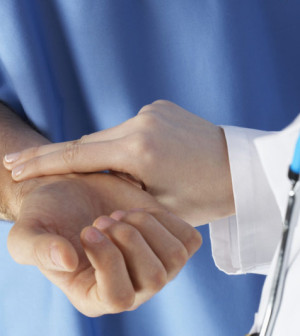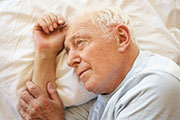- Could Your Grocery Store Meat Be Causing Recurring UTIs?
- Are You Making This Expensive Thermostat Error This Winter?
- Recognizing the Signs of Hypothyroidism
- 10 Strategies to Overcome Insomnia
- Could Artificial Sweeteners Be Aging the Brain Faster?
- Techniques for Soothing Your Nervous System
- Does the Water in Your House Smell Funny? Here’s Why
- Can a Daily Dose of Apple Cider Vinegar Actually Aid Weight Loss?
- 6 Health Beverages That Can Actually Spike Your Blood Sugar
- Treatment Options for Social Anxiety Disorder
Severe Sleep Apnea May Boost Odds for Stubborn High Blood Pressure


Severe sleep apnea may raise the risk of high blood pressure that’s resistant to drug treatment, a new study finds.
Researchers tracked outcomes for patients with moderate or severe sleep apnea, as well as heart disease or heart disease risk factors. All of the patients had been prescribed at least three high blood pressure medications in the past.
The Cleveland Clinic team reports that about 58 percent of the patients with severe sleep apnea had treatment-resistant high blood pressure, compared to just under 29 percent of those with moderate sleep apnea.
The study couldn’t prove cause-and-effect, but the findings “suggest that severe obstructive sleep apnea contributes to poor blood pressure control despite aggressive medication use,” study lead author Dr. Harneet Walia said in a journal news release.
“Poor blood pressure control in patients taking multiple [blood pressure] medications makes them particularly vulnerable to increased cardiovascular risk,” warned Walia, who is assistant professor at the Cleveland Clinic’s Lerner College of Medicine of Case Western Reserve University.
“High blood pressure that is resistant to treatment with medications is a strong warning sign for the presence of obstructive sleep apnea, a chronic disease that increases the risk for heart disease and stroke,” American Academy of Sleep Medicine President Dr. Timothy Morgenthaler added in the news release.
“Over one-third of patients with hypertension and nearly eight out of 10 patients with treatment resistant hypertension have obstructive sleep apnea. People who have high blood pressure should talk to a doctor about their risk for sleep apnea,” he advised.
About 36 million American adults with high blood pressure don’t have it under control, according to the U.S. Centers for Disease Control and Prevention.
The study was published Aug. 15 in the Journal of Clinical Sleep Medicine.
More information
The U.S. National Library of Medicine has more about high blood pressure.
Source: HealthDay
Copyright © 2026 HealthDay. All rights reserved.










